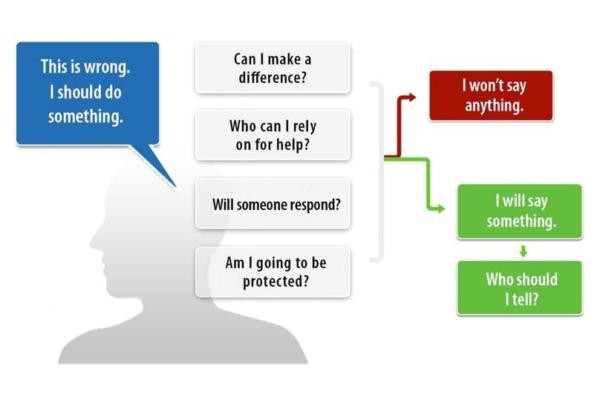Last week, a whistleblower raised allegations of Presidential misconduct and drove Congress to impeachment proceedings. Labeled a traitor by some and a hero by many, the truth is that in many ways, whistleblowers serve as our conscience; these individuals raise concerns that they believe others should know about. But what motivates one to report to an entity outside their organization when they see misconduct?
The 2018 Global Business Ethics Survey (GBES), Measuring the Impact of Ethics & Compliance Programs, found that 47% of people reported observing misconduct and about 70% reported what they saw to a supervisor. In a previous year of the same research, ECI found that fewer than 1 in 5 (18%) of all employees ever report what they have observed to an outside entity – making them a “whistleblower.” The majority of those people (84%) did so only after having reported internally first.
Inside the Mind of a Whistleblower

Source: National Business Ethics Survey 2011, Inside the Mind of a Whistleblower
Whether or not someone will come forward with information of suspected wrongdoing depends upon their feeling that they can make a difference; security in saying something and knowledge of who to tell. The study also found that women and employees of publicly traded companies are more likely to report when they recognize misconduct.
In 2002, TIME Magazine awarded their sought-after Person of the Year award to “The Whistleblowers,” a trio of women responsible for taking down that year’s biggest corporate scandals at WorldCom and Enron; and at the FBI for failing to investigate 9/11 co-conspirator before the 2001 attacks. The Person of the Year recognition is much like the whistleblowers’ actions. They forever change us – for better or for worse.
The Wall Street Journal, supported by whistleblower Tyler Shultz, contributed to the prosecution of self-described Silicon Valley prodigy Elizabeth Holmes and Theranos, her blood-testing company. Shultz shared in a WSJ interview that the technology was bogus. Valued at more than $70 billion, Shultz alleged that Holmes had fooled investors, the media, and corporate partners.
The actions of whistleblowers – and the public’s reaction to them – make this fall’s Best Practice Forum on Preventing Retaliation in the Workplace so timely and important. If you haven’t registered yet, we invite you to do so today. Tyler Shultz will be speaking, and sharing insights on his experience as he raised concern about Theranos. You will also hear from experienced, respected guest speakers from academia, defense and technology as they share their experiences from research and practice. There will also be ample opportunities for best practice sharing and peer-to-peer networking.
Best Practice Forums bring together ethics and compliance professionals to share ideas and learn real strategies to mitigate some of the biggest risks facing organizations.
About the Ethics & Compliance Initiative
The Ethics & Compliance Initiative (ECI) is a non-profit organization that empowers its members across the globe to operate their businesses at the highest levels of integrity. The organization provides research and a best practice community, as well as certification opportunities for ethics & compliance professionals. Through its membership, ECI represents entities across nearly every industry, located in 37 countries on six continents each dedicated to promoting the highest levels of integrity.

